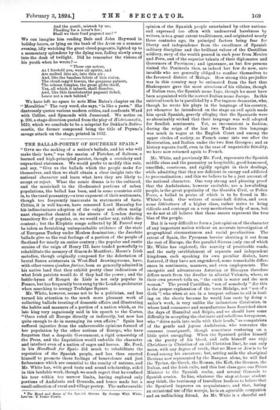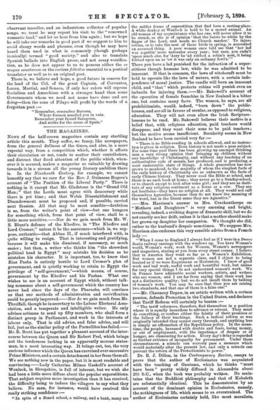THE BALLAD-POETRY OF SOUTHERN SPAIN.* " GrvE me the making
of a nation's ballads, and let who will make their laws," was the maxim of Fletcher, of Saltoun, a learned and high-principled patriot, though a crotchety and unpractical statesman. We would prefer to modify this rule, and say, "Give us the ballads which the people make for themselves, and then we shall obtain a clear insight into the national character and learn what laws they are likely to accept or reject. What the comic drama is to the cultured, and the music-hall to the ill-educated portions of urban populations, the ballad has been, and in some countries still is, to the rural peasantry,—a true exponent of their sentiments, though too frequently inaccurate in statements of facts. Critics, it is well known, have censured Lord Macaulay for his indiscriminate adoption of the vulgar and often malig- nant rhapsodies chanted in the streets of London during transitory fits of popular, or, we would rather say, rabble dis- content ; but the Klephtic songs collected by M. Fauvel may be taken as furnishing unimpeachable evidence of the state of European Turkey under Moslem domination ; the Jacobite ballads give us the real feelings of a portion of the people of Scotland for nearly an entire century ; the popular and rustic strains of the reign of Henry III. have tended powerfully to rehabilitate the memory of Simon de Montfort ; Moore's Irish melodies, though originally composed for the delectation of brutal Saxon aristocrats in West-End drawing-rooms, have, with other verses ejusdem, farina, been so generally admired in his native land that they exhibit pretty clear indications of what Irish patriots would do if they had the power ; and the battle-hymn of Rouget de Lisle is not only popular in France, but has frequently been sung by the London proletariat when marching to occupy Trafalgar Square.
Mr. White, however, seems not to be a politician, and has turned his attention to the much more pleasant work of collecting ballads treating of domestic affairs and illustrating the habits and manners of a portion of a nation which, as its late king very sagaciously said in his speech to the Cortes, " Once ruled all Europe directly or indirectly, but now has quite enough to do in managing its own affairs." Spain has suffered injustice from the unfavourable opinions formed of her population by the other nations of Europe, who have forgotten that a despotic Government, a rigid censorship of the Press, and the Inquisition would enfeeble the character and intellect even of a nation of sages and heroes. Mr. Ford, in his Handbook for Spain, did much to rehabilitate the reputation of the Spanish people, and has thus exerted himself to promote those feelings of benevolence and just forbearance which are essential to the comity of nations, and Mr. White has, with good taste and sound scholarship, aided in this laudable work, though we much regret that he confined his tour within too narrow limits, having explored only portions of Andalusia and Granada, and hence made but a small collection of rural and village poetry. The unfavourable
• The Heart and Songs of the Spa:.ish Sierras. By George Whit White. Lon'on: T. Fisher Unvrie.
opinion of the Spanish people entertained by other nations. and expressed too often with undeserved harshness by writers, is to a great extent traditionary, and originated nearly three centuries ago, its principal factors being fear for liberty and independence from the excellence of Spanish military discipline and the brilliant valour of the Castillian soldiery, envy of the wealth poured in each year from Mexico and Peru, and of the superior talents of their diplomates and Governors of Provinces ; and ignorance, as but few persons visited the Peninsula then, as indeed but few do now, save invalids who are generally obliged to confine themselves to the favoured district of Malaga. How strong this prejudice was in this country may be estimated from the fact that Shakespeare gave the most atrocious of his villains, though of Italian race, the Spanish name Iago, though he must have been acquainted with the correct Italian name Jacopo. In this satirical touch he is paralleled by a Por tuguese dramatist, who, though he wrote his plays in the language of his country, yet whenever he introduced on the stage an evil spirit made him speak Spanish, gravely alleging that the Spaniards were so abominably wicked that their language was well adopted for fiendish sentiments. Yet, so inconsistent is fashion, during the reign of the last two Tudors this language was much in vogue at the English Court and among the upper circles of society, as French came into use after the Restoration, and Italian under the two first Georges ; and as history repeats itself, even in the case of unpatriotic frivolity, we have now returned again to French.
Mr. White, and previously Mr. Ford, represents the Spanish middle class and the peasantry as hospitable, good-humoured, unselfish, courteous, and rigidly upright in their dealings, while admitting that they are deficient in energy and addicted to procrastination ; and this we believe to be a just account of the national character. One very strong and pleasing proof that the Andalusians, however excitable, are a law-abiding people, is the great popularity of the Guardia Civil, or Police Force, a ballad in praise of which is to be found in Mr. White's book. Our writers of music-hall ditties, and even some litterateurs of a higher class, rather strive to bring ridicule and contempt on a very meritorious body of men, but we do not at all believe that these sneers represent the true bias of the people.
But it is very difficult to form a just opinion of the character of any important nation without an accurate investigation of geographical circumstances and racial peculiarities. The extent of Spain, the Pyrenean barrier shutting it out from the rest of Europe, the five parallel Sierras (only one of which Mr. White has explored), the scarcity of practicable roads, and the early establishment of separate and independent kingdoms, each speaking its own peculiar dialect, have fostered, if they have not engendered, some remarkable differ- ences in sentiments, manners, and even employments. The energetic and adventurous Asturian or Biscayan therefore differs much from the dweller in alluvial Valencia, where, as their own proverb tells us, "the earth is water and the men women." The proud Castillian, "son of somebody" (for this is the proper explanation of the term Hidalgo, not "son of a Goth ") who when at sea in a tempest refuses to aid in haul- ing on the sheets because he would lose caste by doing a
sailor's work, is very unlike the industrious Catalonian, in whose land commerce and manufactures have flourished since
the days of Hannibal and Scipio, and we should have some difficulty in accepting the obstinate and rebellious Arragonese, who "drive nails into walls with their beads," as compatriots of the gentle and joyous Andalusian, who venerates the eonsumo (coastguard), though sometimes venturing on a little quiet smuggling. When the Spaniard prides himself on the purity of his blood, and calls himself uno viejo Christiano (a Christian of an old Christian line), he can only mean, with any degree of truth, that no Moor or Jew is to be found among his ancestors; but, setting aside the aboriginal
Iberians now represented by the Basques alone, he will find the Tyrian, the Greek, the Roman, the Kelt, the German, the Italian, and the Irish exile, and this last class gave one Prime
Minister to the Spanish realm, and several Generals to Spanish armies. In fine, whatever the stay-at-home student may think, the testimony of travellers leads us to believe that the Spaniard improves on acquaintance, and that, bating an occasional use of the navaja, he is an agreeable companion and an =flinching friend. As Mr. White is a cheerful and observant traveller, and an industrious collector of popular songs, we trust he may repeat his visit to the "renowned romantic land," and let us hear from him again ; but we hope he will take our remarks in good part if we suggest to him to avoid slangy words and phrases, even though he may have heard them used in what is commonly (though perhaps ironically) termed "good society." and also to translate Spanish ballads into English prose, and not essay versifica- tion, as he does not appear to us to possess either the os magna sonaturum or the curiosa felicitas essential to a poetical translator as well as to an original poet.
There is, we believe and hope, a good future in reserve for the land of the Cid, of the great Captain, of Cervantes, Lucan, Martial, and Seneca, if only her rulers will repress Socialism and Anarchism with a stronger hand than some Governments whom we need not name have done and are doing—then the sons of Pilayo will profit by the words of a forgotten poet :—
"Remember, remember Barossa, Where foemen assailed you in vain. Remember your famed Saragossa, And strike for the cause of Spain."



































 Previous page
Previous page